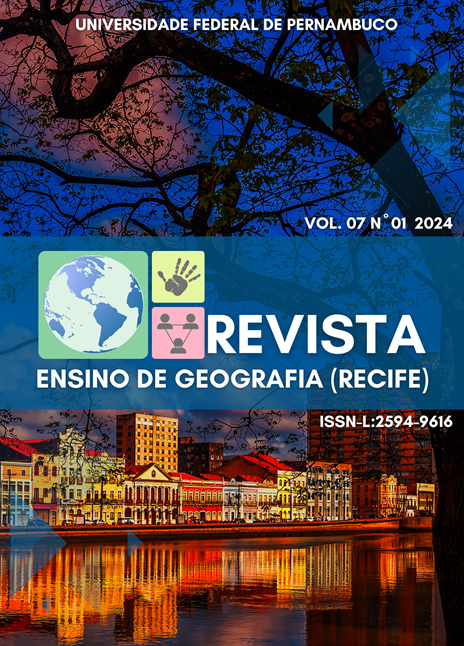Field education: curricular difficulties and relationships with geography
DOI:
https://doi.org/10.51359/2594-9616.2024.261740Keywords:
education, geography, rural educator, disciplineAbstract
This article seeks to expose and unveil how school life in the countryside faces a series of challenges and problematizations that directly affect the quality of education offered and the development of rural communities, interweaving the fundamental role of the geography discipline in this environment, as it offers a comprehensive and contextualized understanding of geographic space, which includes both natural and social characteristics. Bringing great authors and thinkers as a basis for carrying out this work, seeking to promote, through the teaching of geography, the appreciation of culture and local knowledge, by exploring themes that contribute to a better retention among students. In this sense, it is worth highlighting that the subject of geography plays a fundamental role in rural schooling, offering essential tools and knowledge to face the challenges and problems present in this context, and contributing to a more inclusive, contextualized and relevant education for rural students.
References
AMORIM, L. dos R.; DE MACEDO, F. X. Educação do Campo: Contribuições do Educador Paulo Freire. Conedu: VII Congresso Nacional de Educação, 2021.
APPLE, M. W. A política do conhecimento oficial: faz sentido a ideia de um currículo nacional? In: MOREIRA, A. F.; SILVA, T. T. (org.). Currículo, cultura e sociedade. 12. ed. São Paulo: Cortez, 2013.
CARNEIRO, Sônia Maria Marchiorato. Importância educacional da geografia. Educar em Revista, p. 121-125, 1993.
MARGUTTI, E. C; MARIANO, A.; FURLANETTI, M. P. F. R. A importância da Educação no Campo. 2010. In: I Congresso Internacional da Cátedra Unesco de Educação de Jovens e Adultos. João Pessoa/PB, 2010.
PINCHEMEL, P. The aims and Values of Geographical Education. In: GRAVES, N. J. (ed.) New UNESCO source book for Geography Teaching. Longman/The UNESCO Press, 1982, p. 11-13.
SANTOS, M. Metamorfose do espaço habitado: fundamentos teóricos e metodológicos da Geografia. São Paulo: Hucitec, 1991.
SAVIANI, D. Educação: do senso comum à consciência filosófica. São Paulo: Cortez Editora/Autores Associados, 1980, p. 40.
SOUZA, M. A. Educ. Soc., Campinas, vol. 29, n. 105, p. 1089-1111, set./dez. 2008
WERLANG, J.; PEREIRA, P. B. Educação do Campo, CTS, Paulo Freire e Currículo: pesquisas, confluências e aproximações. Ciência & Educação (Bauru), v. 27, p. e21016, 2021.
FERNANDES, B. M.; CERIOLI, P. R.; CALDART, R. S. Referências para uma política nacional de educação do campo: caderno de subsídios. Brasília: Secretaria de Educação Média e Tecnológica, Grupo Permanente de Trabalho de Educação do Campo, 2005.
Downloads
Published
How to Cite
Issue
Section
License
Copyright (c) 2024 Vinícius Feitosa da Silva, Raíssa Pereira Martins

This work is licensed under a Creative Commons Attribution 4.0 International License.
Authors who publish with this journal agree to the following terms:- Authors retain copyright and grant the REVISTA ENSINO DE GEOGRAFIA (RECIFE) right of first publication with the work simultaneously licensed under a Creative Commons Attribution NonCommercial International 4.0 (CC BY-NC) that allows others to share the work with an acknowledgement of the work's authorship and initial publication in this journal.
- Authors are able to enter into separate, additional contractual arrangements for the non-exclusive distribution of the journal's published version of the work (e.g., post it to an institutional repository or publish it in a book), with an acknowledgement of its initial publication in this journal.
- Authors are permitted and encouraged to post their work online (e.g., in institutional repositories or on their website) prior to and during the submission process, as it can lead to productive exchanges, as well as earlier and greater citation of published work.



